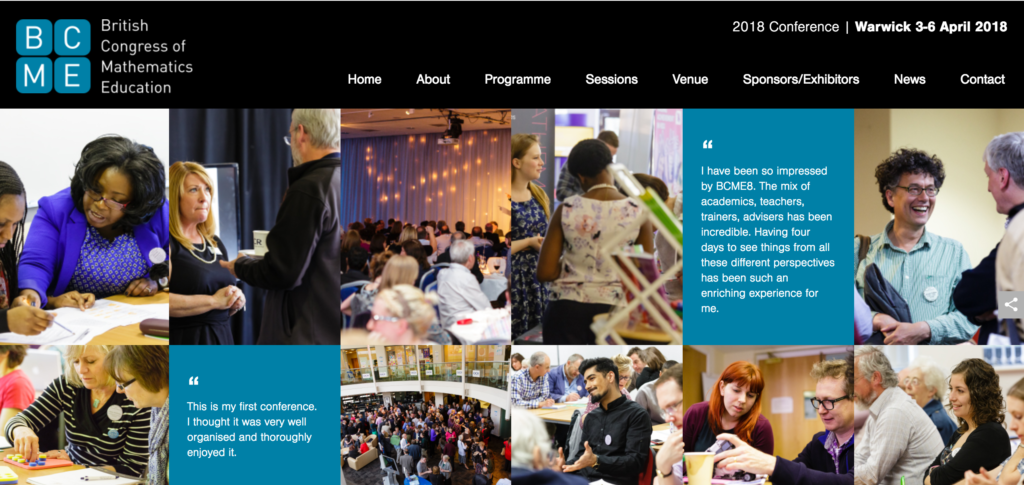In many ways, BCME 9 (British Congress of Mathematics Education) at Warwick in April 2018 was highly successful, with a large attendance, two substantial publications arising from sessions given, and generally positive feedback, though the breadth of choice meant some sessions were poorly attended, and there were long walks between others. BCME 9 also made very great demands on the organisers, and is a major financial risk – on this occasion shared by the Joint Mathematical Council, Association of Teachers of Mathematics and the Mathematical Association. A working group of the JMC’s trustees were therefore asked to undertake a review of BCME. As part of that, oral evidence was taken from a range of stakeholders and from those intimately involved in the organisation of BCME 9.

Historically, BCME began under the auspices of BSRLM, before challenges to its viability led to JMC taking over responsibility. There was agreement that BCME should continue as ‘an integrated programme of practitioner and research sessions in mathematics education under the auspices of the JMC, that encourages delegates to engage in areas they are particularly at home with and in areas new to them, combined with engaging and stimulating workshop, discussion and plenary sessions’ (to quote, in slightly adapted form, the vision for BCME9). Increased participation by teachers would be needed for it to become more fully effective as an interface between practitioners and researchers (for which it was cited as an example of good practice in the recently published report by The British Academy and The Royal Society, Harnessing educational research, section 4.5, page 76. There was also a desire to involve more JMC bodies in the event.
There appears to be a general desire for a smaller, shorter, more focussed conference which would be more affordable for attendees, less demanding to organise and a lower financial risk. Accommodation should be unpacked from the conference package for delegates to book independently (with the possibility of negotiated discounts). This would give more choice of possible venues and types of accommodation. The administration of the conference would be put out to tender (the contractor might be a mathematical organisation or a commercial one). One way of running such a BCME would be as follows.
- The focus would be on practitioner interaction with research and with developments in the field (BSRLM would play a key role in this as would other JMC bodies). There should be sufficient classroom relevance that teachers can access professional development funding and proceedings would be produced as a publication route for researchers.
- The conference would be held over three consecutive days in June or July every four years. The three days would have overlapping foci:
- mathematics education for 3-13 year olds,
- mathematics education for 11-18 year olds,
- mathematics education for 16+ (including 18+).
Many of those attending would do so for one day but the overlapping foci would encourage longer attendance.
- Each day would have a separate programme subcommittee and the days might have different structures within a 09:30 to 18:30 envelope. The programme subcommittees would plan programmes and place less reliance on the volunteering of sessions; the number of parallel sessions would be limited to reduce the risk of very poorly attended sessions.
- Lunch and morning and afternoon refreshments would be provided but delegates would organise their own accommodation and other meals.
Such a structure and timing might impact on participation in the BSRLM summer events, and/or other summer conferences; equally, the current Easter arrangement precludes ATM or MA from running their own Easter conference. The suggested division between days is one of several possibilities, none of which seems ideal.
So… if you have ideas about improvements to the above model, particularly in relation to impact on, or opportunity for, BSRLM, do please send them directly to Jennie Golding (j.golding@ucl.ac.uk).
The issue will be discussed at the JMC meeting on 19th February meeting, though later contributions are also welcome.
Dr Jennie Golding
Associate Professor
UCL Institute of Education